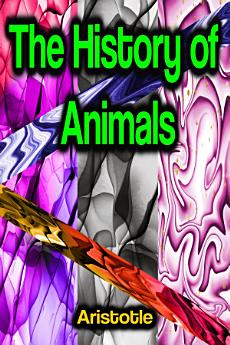The History of Animals
ნოე. 2021 · Phoemixx Classics Ebooks
ელწიგნი
777
გვერდი
family_home
მისაღები
info
reportრეიტინგები და მიმოხილვები დაუდასტურებელია შეიტყვეთ მეტი
ამ ელწიგნის შესახებ
The History of Animals Aristotle - The following Translation of Aristotle's History of Animals has been made from the text of Schneider. In a work of considerable difficulty it is hardly possible entirely to avoid errors; but it is hoped that those which have escaped are neither numerous nor important. The notes of Schneider have been consulted throughout; and in places of difficulty the English translation by Taylor; the French of Camus; and the German of Strack; have been severally referred to.The work itself is the most ancient and celebrated contribution to science which has come down to us; and it is hardly possible; when we consider the means of observation which were accessible at the time; to imagine a work of more accurate observation. From the numerous quotations in which our author avails himself of the experience of his predecessors in the same field; as well as corrects their errors; there can be no doubt that Aristotle had the advantage of many works which have perished in the lapse of ages. In the Appendix to the present Translation will be found the Essay of Schneider on the sources whence Aristotle derived his knowledge of the animals he describes; and these sources; together with his own accurate observations; are probably sufficient to account for the correct knowledge of the history of animals displayed throughout the work.
ავტორის შესახებ
Aristotle (384322 B.C.) numbers among the greatest philosophers of all time. Judged solely in terms of his philosophical influence, only Plato is his peer: Aristotle's works shaped centuries of philosophy from Late Antiquity through the Renaissance, and even today continue to be studied with keen, non-antiquarian interest. A prodigious researcher and writer, Aristotle left a great body of work, perhaps numbering as many as two-hundred treatises, from which approximately thirty-one survive. His extant writings span a wide range of disciplines, from logic, metaphysics and philosophy of mind, through ethics, political theory, aesthetics and rhetoric, and into such primarily non-philosophical fields as empirical biology, where he excelled at detailed plant and animal observation and taxonomy. In all these areas, Aristotle's theories have provided illumination, met with resistance, sparked debate, and generally stimulated the sustained interest of an abiding readership.Because of its wide range and its remoteness in time, Aristotle's philosophy defies easy encapsulation. The long history of interpretation and appropriation of Aristotelian texts and themesspanning over two millennia and comprising philosophers working within a variety of religious and secular traditionshas rendered even basic points of interpretation controversial. The set of entries on Aristotle in this site addresses this situation by proceeding in three tiers. First, the present, general entry offers a brief account of Aristotle's life and characterizes his central philosophical commitments, highlighting his most distinctive methods and most influential achievements. Second are General Topics which offer detailed introductions to the main areas of Aristotle's philosophical activity. Finally, there follow Special Topics which investigate in greater detail more narrowly focused issues, especially those of central concern in recent Aristotelian scholarship.
შეაფასეთ ეს ელწიგნი
გვითხარით თქვენი აზრი.
ინფორმაცია წაკითხვასთან დაკავშირებით
სმარტფონები და ტაბლეტები
დააინსტალირეთ Google Play Books აპი Android და iPad/iPhone მოწყობილობებისთვის. ის ავტომატურად განახორციელებს სინქრონიზაციას თქვენს ანგარიშთან და საშუალებას მოგცემთ, წაიკითხოთ სასურველი კონტენტი ნებისმიერ ადგილას, როგორც ონლაინ, ისე ხაზგარეშე რეჟიმში.
ლეპტოპები და კომპიუტერები
Google Play-ში შეძენილი აუდიოწიგნების მოსმენა თქვენი კომპიუტერის ვებ-ბრაუზერის გამოყენებით შეგიძლიათ.
ელწამკითხველები და სხვა მოწყობილობები
ელექტრონული მელნის მოწყობილობებზე წასაკითხად, როგორიცაა Kobo eReaders, თქვენ უნდა ჩამოტვირთოთ ფაილი და გადაიტანოთ იგი თქვენს მოწყობილობაში. დახმარების ცენტრის დეტალური ინსტრუქციების მიხედვით გადაიტანეთ ფაილები მხარდაჭერილ ელწამკითხველებზე.








